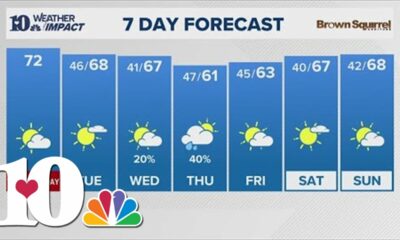Mississippi Today
On this day in 1914


Nov. 12, 1914

Civil rights leader William Monroe Trotter led a delegation that confronted President Woodrow Wilson.
Raised in Hyde Park, Massachusetts, Trotter had more education than the president. He had graduate and postgraduate degrees from Harvard University, where he became the first Black member of Phi Beta Kappa.
“New Englanders liked to talk as if ‘the Negro problem’ afflicted only the South,” The New Yorker wrote of him, “but Trotter looked around his beloved Boston and saw segregation in the city’s churches, gyms, and hospitals. This ‘fixed caste of color’ meant that ‘every colored American would be a civic outcast, forever alien in public life,’ he wrote.”
In 1901, he started The Guardian with the motto: “For every right, with all thy might.” The newspaper called itself “an organ which is to voice intelligently the needs and aspirations” of Black Americans.”
Both he and his wife, Deenie, published The Guardian each Saturday, only missing two issues: “The Trotters had no children and did not want any; The Guardian was their child.”
In their pages, Trotter leveled vicious attacks against Booker T. Washington and his accommodation policies, calling him “the Great Traitor.” When Trotter began to question Washington at a gathering of 2,000, a fight broke out, which became known as “the Boston riot,” and he was arrested, spending 30 days in jail. The wealth his family once enjoyed turned to poverty because of the money he sunk into his newspaper.
“It has cost me considerable money, but I could not keep out of it,” he wrote. “I can now feel that I am doing my duty and trying to show the light to those in darkness and keep them from at least being duped into helping in their own enslavement.”
He turned his attention to political candidates he felt would support African Americans and began backing Wilson, whom he met and shook hands with in 1912 “with great cordiality.”
A year later, he and Ida B. Wells and other civil rights leaders expressed dismay over the reinstitution of Jim Crow and even shared a chart that showed which federal offices had begun separating workers by race.
In 1914, Trotter and other Black leaders appeared at the White House with 20,000 signatures, demanding an end to Jim Crow in federal offices. The leaders told Wilson they felt betrayed because they had supported him in the election, and he had since reinstituted segregation in the federal government that included separate toilets and dismissed high-level Black appointees.
“Only two years ago you were heralded as perhaps the second Lincoln,” Trotter said, “and now the Afro-American leaders who supported you are hounded as false leaders and traitors to their race.”
He reminded the president — who had been busy championing his “New Freedom” program to restore fair-labor practices — that he had promised to aid Black Americans in “advancing the interest of their race in the United States. … Have you a ‘New Freedom’ for white Americans and a new slavery for your Afro-American fellow citizens? God forbid!”
Wilson responded that “segregation is not humiliating but a benefit” and that he had put the practice back in place because of friction between Black and white clerks. Trotter challenged this claim, calling Jim Crow humiliating to Black workers.
Wilson stuck to his guns, telling Trotter that if he and other Black Americans think “you are being humiliated, you will believe it.” The exchange lasted 45 minutes, and the president challenged Trotter’s “tone” as offensive: “You have spoiled the whole cause for which you came.”
The civil rights leader responded, “I am pleading for simple justice. If my tone has seemed so contentious, why has my tone been misunderstood?”
The argument landed on the front page of The New York Times. During World War I, the State Department refused to give Trotter a passport to Paris. To get around the restriction, he took a job as a cook on a freighter to France, and when he began reporting on the plight of Black soldiers, French newspapers shared his reporting, and he spoke there about discrimination against African Americans.
When Trotter returned home, he was welcomed by 2,000 supporters. He unsuccessfully championed a section added to Wilson’s 14 Points for peace that would say, “The elimination of civil, political, and judicial distinctions based on race or color in all nations for the new era of freedom everywhere.”
Trotter helped found the Niagara Movement, a forerunner of the NAACP. The civil rights organization adopted his proposal to address segregated transportation as a grievance, but the group rejected his proposal to make lynching a federal crime.
He championed cases the NAACP was slower to pursue, including Jane Bosfield, a Black woman was told she could only work for a Massachusetts hospital if she ate separately from her white fellow workers.
When the racist movie, ‘The Birth of a Nation’, appeared on a screen, the national NAACP tried to raise money for a rival film to counter those lies, but Trotter believed in direct action. His protests succeeded in shutting down a play that was the basis for the movie, which depicted Klansmen as heroes. After failing to halt the debut of the film in Boston, he teamed up with Roman Catholics to get a revival showing canceled.
His tactics were later used by the modern civil rights movement “to integrate lunch counters, buses, schools, and other essential spaces,” The New Yorker wrote. And his mindset “incubated the politics of Malcolm X and of the Reverend Martin Luther King Jr.”
A multicultural center at the University of Michigan bears Trotter’s name, and his first home in Dorchester is now a National Historic Landmark. He made the list of the 100 Greatest African Americans.
This article first appeared on Mississippi Today and is republished here under a Creative Commons license.![]()
Mississippi Today
On this day in 1960


Nov. 14, 1960

Federal marshals escorted 6-year-old Ruby Bridges into William Frantz Elementary School in New Orleans. Day after day, whites jeered at the Mississippi native and three other Black children, Leona Tate, Gail Etienne and Tessie Prevost, who became the first to attend all-white elementary schools in the South.
Many white families left the school in protest, but Barbara Henry stayed and taught Bridges. Norman Rockwell depicted Bridges’ entry in his painting “The Problem We All Live With,” and she received the Presidential Citizens Medal in 2001. There is now a statue of her outside the elementary school, which bears her name.
“I was an innocent child that knew absolutely nothing about what was happening that day,” she recalled, “but I learned a very valuable lesson — we should never look at a person and judge them by the color of their skin. That’s the lesson I learned in first grade.”
This article first appeared on Mississippi Today and is republished here under a Creative Commons license.![]()
Mississippi Today
Gov. Reeves announces $110 million in economic development efforts

Republican Gov. Tate Reeves on Wednesday announced that state agencies are disbursing over $110 million toward economic development, infrastructure upgrades and workforce development around the state.
The funding for the projects is coming from the state Legislature, the Appalachian Regional Commission, the Delta Regional Authority, the Southeast Crescent Regional Commission and the federal government.
“We’ve secured billions in new private-sector investment and created thousands of jobs across the state,” Reeves said. “The funding we announced today will go a long way toward continuing Mississippi’s economic momentum and will help create more high-paying job opportunities for Mississippians across the state.”
The bulk of the spending will go toward developing and improving industrial sites, which are often used to entice manufacturing companies to locate or expand operations in the state. If these sites have adequate infrastructure near them, companies are more likely to locate there.
Despite new investment in the state, Mississippi continues to grapple with one of the lowest rates in the nation of people who are actively seeking work or employed, at 53.9%.
State Economist Corey Miller said at a legislative hearing last week that one of the reasons Mississippi is also experiencing a relatively low unemployment rate of 2.8% is because people have stopped looking for jobs.
Reeves said on Wednesday that Mississippi may have a low percentage of people looking for jobs because the state has a relatively low cost of living and some families can afford to have only one income.
“If an individual doesn’t want a job, the government ain’t going to force them to get a job,” Reeves said. “And that’s just a reality.”
Still, the governor believes Mississippi can improve its labor force participation rate by improving education and providing people with better work skills.
This article first appeared on Mississippi Today and is republished here under a Creative Commons license.![]()
Mississippi Today
Groups seek a new hearing on a Mississippi mail-in ballot lawsuit

JACKSON, Miss. (AP) — A federal appeals court panel incorrectly interpreted federal and state laws when it ruled that Mississippi cannot count mail-in ballots that are cast and postmarked by Election Day but arrive a few days later, two groups argue as they seek a new hearing.
Attorneys for Vet Voice Foundation and Mississippi Alliance for Retired Americans are asking the entire 5th U.S. Circuit Court of Appeals to reconsider the ruling that a portion of the court issued Oct. 25.
The ruling did not affect the counting of ballots for the Nov. 5 election because the three-judge panel noted that federal court precedents discourage court actions that change established procedures shortly before an election.
However, the case could affect voting across the U.S. if the Supreme Court ultimately issues a ruling.
The attorneys for Vet Voice Foundation and the Mississippi Alliance for Retired Americans argue in court papers filed Friday that the panel of judges “incorrectly suggested that post-election day ballot receipt deadlines are a recent invention.”
“In fact, the practice of counting ballots cast by election day but received afterward goes back to the Civil War, when many states permitted soldiers to vote in the field before sending their ballots to soldiers’ home precincts,” attorneys for the two groups wrote.
Many states have laws that allow counting of ballots that are cast by Election Day but received later, the attorneys wrote.
“Far from making any attempt to preempt these laws, Congress has acknowledged and approved of them for more than five decades,” they wrote.
The three-judge panel of the conservative appeals court reversed a July decision by U.S. District Judge Louis Guirola Jr., who had dismissed challenges to Mississippi’s election law by the Republican National Committee, the Libertarian Party of Mississippi and others.
Richard Hasen, a professor at the University of California, Los Angeles School of Law, wrote on his election law blog that the ruling by the appeals court panel was a “bonkers opinion” and noted that “every other court to face these cases has rejected this argument.”
Republicans filed more than 100 lawsuits challenging various aspects of vote-casting after being chastised repeatedly by judges in 2020 for bringing complaints about how the election was run only after votes were tallied.
The list of states that allow mailed ballots to be counted if they are postmarked by Election Day includes swing states such as Nevada and states such as Colorado, Oregon and Utah that rely heavily on mail voting.
In July, a federal judge dismissed a similar lawsuit over counting mailed ballots in Nevada. The Republican National Committee has asked the 9th Circuit Court of Appeals to revive that case.
Guirola wrote that Mississippi’s law does not conflict with federal election laws. The suit challenging the Mississippi law argued that the state improperly extends the federal election and that, as a result, “timely, valid ballots are diluted by untimely, invalid ballots.”
Guirola disagreed, writing that “no ‘final selection’ is made after the federal election day under Mississippi’s law. All that occurs after election day is the delivery and counting of ballots cast on or before election day.”
Although the Mississippi challenge was led by Republicans and Libertarians, there is bipartisan support for the state’s practice. Mississippi Attorney General Lynn Fitch is defending the state’s top election official, Secretary of State Michael Watson, in the lawsuit. Both are Republicans.
Associated Press reporters Kevin McGill in New Orleans and Mark Sherman in Washington contributed to this report.
This article first appeared on Mississippi Today and is republished here under a Creative Commons license.![]()
-

 News from the South - North Carolina News Feed7 days ago
News from the South - North Carolina News Feed7 days agoArrest made in I-40 Shootings: 7 cars have been shot, 1 woman injured
-

 Local News5 days ago
Local News5 days ago84% of Mississippi 3rd graders pass reading assessment for 2023-24 school year
-

 News from the South - Alabama News Feed3 days ago
News from the South - Alabama News Feed3 days agoCrash involving MPD vehicle
-

 Mississippi Today6 days ago
Mississippi Today6 days agoOn this day in 1955
-

 News from the South - Missouri News Feed3 days ago
News from the South - Missouri News Feed3 days agoVeterans honored across Missouri, Illinois for Veterans day
-

 News from the South - Georgia News Feed3 days ago
News from the South - Georgia News Feed3 days agoWho will serve in Trump’s cabinet? | FOX 5 News
-

 Mississippi News Video3 days ago
Mississippi News Video3 days agoThe War Memorial Building in Jackson
-

 News from the South - Tennessee News Feed3 days ago
News from the South - Tennessee News Feed3 days agoAfternoon Weather (11/11): Dry afternoon ahead






















